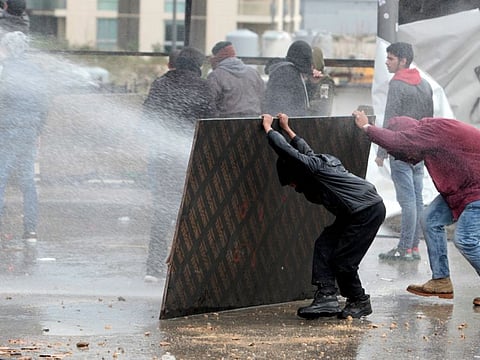Lebanese security forces, protesters clash ahead of vote
Protesters in central Beirut tried to stop a confidence vote in parliament Tuesday

Beirut: Lebanese security forces fired tear gas and water cannon at protesters trying to block MPs and ministers from reaching parliament on Tuesday for a vote of confidence in Prime Minister Hassan Diab’s new cabinet.
MPs are set to vote on a government policy statement that says “painful steps” are needed to address a financial crisis which has led the currency to lose a third of its value and banks to severely curb access to deposits.
Seeking to thwart the vote, hundreds of protesters gathered from early in the morning in central Beirut where security forces blocked off all the roads leading to the barricaded parliament building.
Hundreds of protesters gathered in central Beirut to try to block MPs from reaching the parliamentary building. Security forces blocked off all the roads leading to the barricaded parliament district.
Men and women, their faces wrapped in scarves, lobbed rocks at security forces deployed at several locations around the city centre as clouds of tear gas engulfed them.
Eggs and Paint
Protesters hurled eggs and threw paint at the cars of lawmakers and ministers while others tried to smash their tinted windows.
Protesters lobbed rocks at security forces deployed at several locations around the city centre.
Some MPs skirted the clashes, arriving at parliament on the back of motorcycles. Crowds chanted revolution, waved Lebanese flags and held signs that said "no confidence".
One of the world's most heavily indebted states, Lebanon is facing a crisis rooted in decades of state waste and corruption which have fuelled public anger.
The crisis came to a head last year as slowing flows of capital from abroad led to a hard currency crunch and protests erupted across the country against the ruling elite.
Lebanon needs IMF technical help
The crisis came to a head last year as slowing flows of capital from abroad led to a hard currency crunch and protests erupted against the ruling elite.
Parliament Speaker Nabih Berri has said Lebanon should seek IMF technical help and take a decision on whether to pay maturing foreign debt next month based on IMF advice, An Nahar newspaper and a government source said on Tuesday.
Lebanon could not, however, surrender itself to the IMF because the nation could not bear its conditions, he said.
Berri is one of the most influential figures in the country and his Amal Movement named a number of ministers in the Diab-led cabinet which took office last month, including the minister of finance.
Berri said Lebanon must take advantage of the time remaining before its next debt maturity on March 9 to send a message abroad, “specifically to the Americans” that the country needs IMF technical help through a rescue plan.
“There is still room for Lebanon during the coming two weeks and before the end of the current month to benefit from this measure,” Berri was quoted as saying.
Based on this, “Lebanon will be able to form its position on the maturing Eurobonds - whether to pay its commitments or not to pay them - based on what the IMF advises.” But Berri also said the Lebanese people would be unable to bear IMF conditions, saying Lebanon was not Greece or Argentina - countries that have experienced their own financial crises.
The problem
Protesters in central Beirut tried to stop a confidence vote in parliament Tuesday on the new government they say fails to address their demands and cannot rescue the ailing country.
"I'm here to say 'no confidence' in the government because the way it was formed shows that it cannot be trusted," said one protester who gave her name as Carole.
Hassan Diab, a little-known academic and former education minister, was tasked with forming a government in December after Saad Hariri was forced to resign from his post as prime minister by pressure from the street.
The unprecedented wave of cross-sectarian demonstrations has pushed for the wholesale removal of a hereditary political elite seen as corrupt and incompetent.
While Diab vowed to carry the hopes of the protesters, portfolios in his government were shared out through the same partisan and sectarian gamesmanship that has been the trademark of Lebanon's political class for decades.
If approved by parliament, the new government will face one of the worst crises in the county's recent history.
Besides the biggest popular challenge to the power-sharing system that emerged from the 1975-1990 civil war, the country faces its worst economic crisis in decades.
Lebanon is on the brink of defaulting on its debt and the impact is being felt by all social classes, with tough restrictions on cash withdrawals and a devaluation of the national currency.








